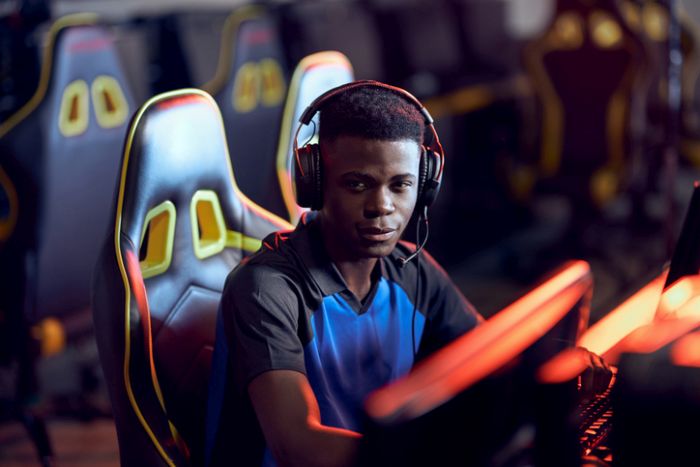
From the true-life tale of Hoop Dreams to the fictional narrative of Million Dollar Baby, we all love the story of the athlete rising up from humble beginnings using nothing but raw determination. It’s a tale as old as time. A young person with little more than talent and passion to their name works harder than the rest and finds a better life through a commitment to their sport.
But the world of sports is expanding. While not yet ubiquitous, eSports are gaining traction not just with aspiring professionals, but also with viewers. And viewers are like chum in the water for corporations eager to sponsor the right pro to gobble up potential consumers.

Crowds, Sponsors, and aspiring Professionals are flocking to eSports
“esports” by sam_churchill is licensed under CC BY 2.0
The world of eSports suffers from some unique challenges, however. The base level of equipment needed to participate in eSports is generally much higher than many physical sports. There’s also as of yet no direct path for an up-and-coming gamer to up and come from enthusiast to pro.
But traditional physical sports are not perfectly equitable by any means, and those with the money to pursue their passion more devotedly have many advantages over even the most talented athlete struggling with poverty.
All this begs the question: Is the inequity of eSports any different from that of more established sports?
Game Gear

A gamer can only be as good as their gear
The first and most obvious hurdle for aspiring pro gamers is equipment. Whereas a passionate young basketball player can get their start with a ball that can cost less than $10, and some professional soccer players started without a real ball or even shoes, anyone who wants to engage in eSports even casually needs tech that very rarely comes cheap.
At the base level, many lower-income gamers find value in playing on cell phones or other handheld devices. This is great, and in the right game, it can even be competitive up to a pretty high level, but even this presents a challenge. A kid can practice basketball at a public court, but to hone their Fortnite skills they’ll need access to the internet.
While there are public connectivity options for young gamers, relying on a free Wi-Fi signal is disadvantageous in more critical aspects such as education, which raises equity concerns far more alarming than any connected to eSports. In a gaming context, for the purposes of this article, a public connection often means sharing signals with others and that can inhibit the effectiveness of even the best gamer with top-tier equipment.
Not every sport has the same low cost of entry as basketball or soccer, of course. Hockey, for example, requires skates, a stick, and time on the ice which, unless you live in the arctic circle, usually means paying a fee. And that’s not even factoring in helmets and pads which are required at almost every competitive level.
But hockey benefits from being a long-standing, widely accepted sport. There are lots of equipment options, ranging from rentals to financial aid. That kind of support is barely in its infancy where eSports are concerned, and while we’re starting to see support for low-income would-be pro-gamers in other markets, here in the USA, that kind of support has yet to truly take root.
Even if a low-income gamer finds a reliable connection to the internet, they’ve only gained access to the playing field. In many of the games that comprise the world of professional eSports, the top competition is operating on a level where milliseconds separate victory from defeat.
When that is the case, no handheld device is going to deliver the performance you need to remain competitive. That level of competition thrives on top-of-the-line equipment, which can be prohibitively expensive, even for those of us not wrestling with the poverty line.
Shop for your own gaming gear like keyboards, mice, furniture, and more!
Climbing Without a Ladder

There is no clear path to the top for eSports professionals
The other major problem is structural. There is no ladder to climb for a talented young gamer to ascend from casual to professional. That’s unlike, say, a baseball player, who might start in little league and advance to travel ball and high school, where he’s discovered by talent scouts to play in bigger and better games in college or the minor leagues.
Right now, eSports has no such structure. That might be understandable given how new eSports is in general, but it doesn’t make it easier for those who would seek to make this passion their profession. There are a few in-roads that have proven successful for more than one gamer. Live-streaming is a big one but even this presents challenges.
Streaming is a great way to build a following and get noticed but it’s even more taxing on a machine and internet connection than gaming alone. This means it requires an even more substantial machine as well as abundant internet bandwidth, and all that means even more money.
That being said, streaming can be a source of income that helps a gamer sustain his or her passion, although reaching that level takes time and presents yet another challenge that most other aspiring sports pros don’t really need to worry about: personality.
A steamer generally can’t rely solely on his or her ability. A golfer might have a signature quirk or phrase that their fans come to love, but by in large, people pay to watch a professional athlete play the game. When you tune in to a gamer’s Twitch stream, it’s often about their reactions, banter, and personality just as much as it is about appreciating their skill at any game.
This extra hoop that would-be eSports pros face is yet another inequity between this growing profession and the more-established athletic counterparts.
But traditional sports have hoops of their own, and it almost always comes back to money. That young baseball player we discussed earlier may have more options, but almost every one of them costs money. Not only in equipment, not even just in league fees. To be truly competitive the best and brightest go to expensive training camps.
And to have the best chance at a good college team, a baseball player can’t rely on their high school league. The best baseball players are drafted from traveling leagues which can cost families as much as $150,00 a year, to support the aspirations of an eleven-year-old athlete.
There is another sport out there, like eSports, that has a high cost of entry and had no development ladder until they made it for themselves. This community of enthusiasts got the attention of corporate sponsors and did something incredible that might just provide a rough blueprint for how an eSports ladder might take shape.
The Sports Car Club of America (SCCA) is a grassroots community built around a passion for racing cars. Not only do they put on events and races, they work with drivers and select corporations to offer scholarships and training to promising and passionate drivers. Some people get help buying or fixing their ride. Some people find teammates or friendly rivals to help hone their skills. This community strives to make sure anyone who is willing to work hard enough has a shot at victory, and the chance to grab the next rung of a ladder they helped build themselves.
The SCCA is fiercely competitive, but also wonderfully supportive and that is a shared trait with competitive gaming. There will always be trash talkers and overly aggressive members of any competitive community, but the shared passion often outshines the less savory characters, and people supporting each other can often lead to truly incredible things.
Check out Prebuilt Gaming Desktops or spec one out yourself with ENIAC PC Builder
Light at the end of the Tunnel

More attention means more fans, means more money, means more opportunity.
All in all, it seems that the road to eSports glory may hold some extra challenges for those operating near or below the poverty line. These people almost always face adversity that many of us will never have to consider. Fortunately, the future presents several avenues of hope for those light on means, but big on eSports dreams.
Variety is the spice of life, and it’s what makes video games such an open and inclusive space to begin with. There’s something for everyone. As more people spend more time online “everyone” is becoming a deeper and deeper well to draw from. More people means more potential views but also more opportunity for niche interests and subcultures to develop, each with their own celebrities and champions. The fact that there will always be a new videogame also means there’s always an opportunity for new talent.
This is also true of the metaspace of eSports. The number of ways to compete is expanding. It’s not just about the fastest time in Gran Turismo, mastering combos in Street Fighter, or total control in League of Legends anymore. Speed runs are a popular challenge many streamers take on, and there are even bounties put out by major sponsors that pay real world cash to those who can find new faster routes through your favorite video games. The ever-growing world of digital card battle games like Hearthstone or Magic the Gathering, is another path that could well be an article unto itself.
We’re also seeing more investment in eSports than ever before. Philadelphia just built a $50 million, 3,500 guest capacity eSports arena for their franchise, the Philadelphia Fusion, to call home, and Toronto is not far behind for their Overwatch and Call of Duty teams, the Toronto Defiant and Ultra respectively.
Colleges are getting in on the act with eSports teams of their own and, you guessed it, scholarships. More than fifteen schools across ten states offer eSports scholarships and a good deal more have eSports teams.

The future of eSports is bright
And that’s just North America. In other parts of the world eSports talent is much more carefully cultivated, and opportunities are intentionally made for those struggling with poverty.
In Brazil, eSports can be a viable path out of poverty, and the rags to riches dream is alive and well. Brazilian eSports teams that seek out promising underprivileged gamers have been established and so too have competitions that only accept teams from the impoverished favela neighborhoods that exist on the outskirts of major cities. These tournaments offer prize money of course, but much more importantly they offer undiscovered talent the opportunity to shine on national television and in front of the eSports community at large.
If history has taught us anything about the public whose views and money fuel the world of professional sports, it’s that we love the story. We love to hear about a passionate young dreamer who started with nothing but talent and ambition, who worked themselves ragged until they were the best in the game.
It’s no secret and those that wish to profit off the emergence of a new sport will, as they have with many other sports, find the benefit of scouting emerging talent. They might even find it beneficial to invest in creating the space where aspiring talent is given the opportunity to emerge.
It’s not news that people with more money have more opportunities and an easier path to success than those with less money. It is unfortunate that the divide is still so pronounced in the world of eSports, but it doesn’t seem wildly disparate from that of other sports, and it doesn’t exist in a vacuum.
The world at large is waking up to the excitement and allure of eSports, and as public demand for this content grows, so too will the need for talented, passionate professionals and luckily, both talent and passion are free.
It is still exclusive in its cost. But you are seldom likely to find a more inclusive, helpful, and enthusiastic community than that of those on the rocky road to eSports glory.

